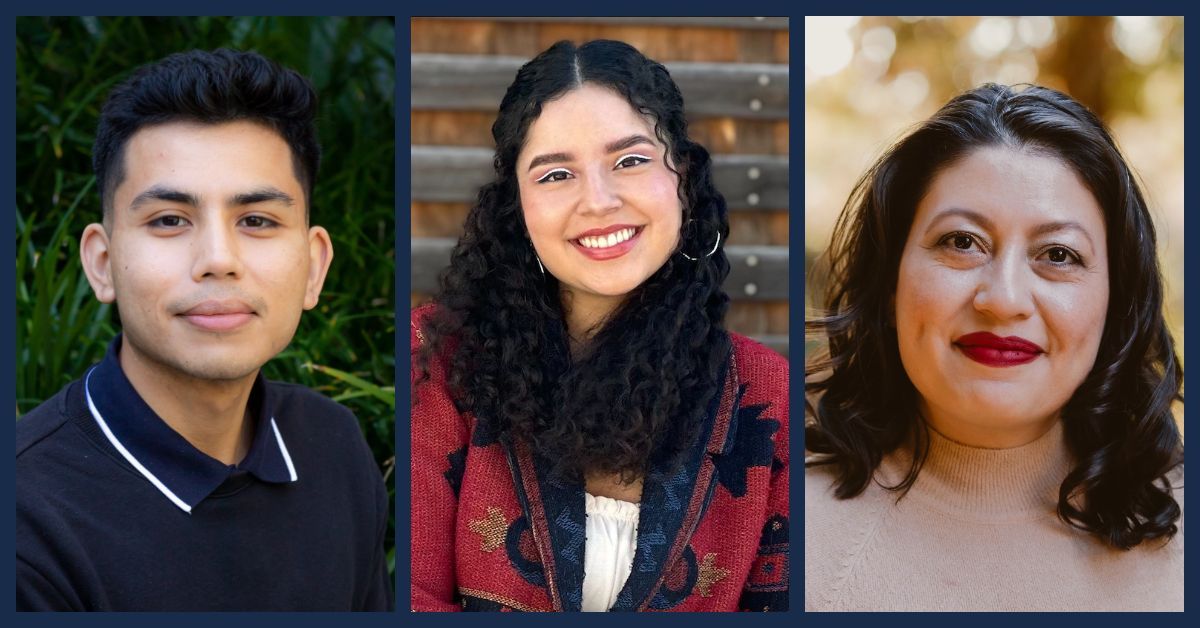Celebrando y Luchando por La Causa: Meet Three Tritons Fighting for the Cause
Story by:
Published Date
Article Content
Born on March 31, 1927, César E. Chávez was a Mexican-American labor leader and civil rights activist who paved the way for better wages and working conditions for farmworkers. He dedicated his life to what is referred to as La Causa (The Cause), a movement aimed to achieve justice and enduring change for the workers responsible for putting food on tables across the nation.
This April, UC San Diego will commemorate Chávez’s life and legacy through a series of events inspired by the theme "Celebrando y Luchando por La Causa; Celebrating and Fighting for the Cause." Students, staff and faculty are encouraged to participate in a variety of activities that honor the labor leader's core values, such as celebrating community, fostering innovation and advancing knowledge.
To kick off UC San Diego’s César E. Chávez celebration month, we are highlighting three Tritons who are passionately advocating for causes close to their own hearts.
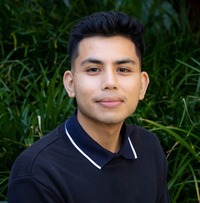
Jonathan Rodriguez
Jonathan Rodriguez
Cognitive science and global health undergraduate
2023-24 UC San Diego College Corps Fellow
Co-Chair for HOP (Health Outreach Program) within UC San Diego’s Health and Medical Professions Preparation Program
Rodriguez, a returning participant in the university’s College Corps program, is currently dedicating 450 service hours to supporting K-12 education at his former high school. As an AVID (Advancement Via Individual Determination) tutor, he helps prepare Crawford High School students for college eligibility and success.
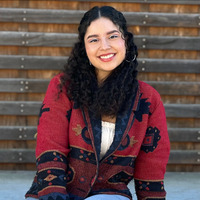
Marissa Islas
B.A. Global Health, ’21
Basic Needs Housing and Education Assistant, The Hub Basic Needs Center
Now in her third year as the basic needs housing and education assistant at The Hub, Islas works to ensure that students have access to safe and stable housing. She assists students in navigating housing resources as they transition from on-campus to off-campus living or when experiencing general transitional housing needs. Prior to this role, Marissa worked as a peer educator at The Hub. She proudly identifies as a queer Chicana and is a first-generation college student.
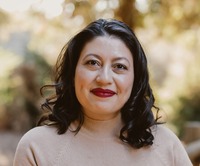
Haydee Cervantes Salazar
B.A. Political Science & International Migration Studies, ’07
2nd Year Experience Program Coordinator, OASIS
Salazar, who will be marking her 13th year working at UC San Diego, serves as the 2nd Year Experience program coordinator at OASIS. As a UC San Diego alumna, she is the first in her family to move away for college and the second to attend college. Her university journey began in 2003 with her participation in the campus’s first-year transitional program, Summer Bridge. In her capacity at OASIS, she coordinates retention and success programs to help hundreds of students achieve their academic goals.
Through hard work, perseverance and sacrifice, César E. Chávez passionately dedicated his life to advocating for the rights and protections of farmworkers. Can you share with us a cause close to your heart that you are dedicated to?
“I am very dedicated to increasing diversity in the education system and professional system through better exposure of opportunities for underrepresented students. In my role as a College Corps fellow tutoring students at Crawford High School—my former high school where many students come from low-income households—we assist in giving students the resources, advice, tutoring and mentorship that they might not have access to otherwise. As the co-chair of HMP3, I conduct medical workshops for local high schools, with a focus on students from primarily low-income and underrepresented minority backgrounds. My aim is to contribute to boosting diversity in the pool of future applicants pursuing careers in medicine.” - Jonathan Rodriguez
“I devote myself to ideating within spaces where we collectively show up with intention, authenticity, and a teachable heart to reclaim our power. Engaging in basic needs work is challenging and involves a significant amount of trauma-informed care and emotional labor. Therefore, to effectively address these challenges, you must show up with the passion to dismantle systems of oppression and check in with members of the community to create solutions. Together, we can build a world where we don’t have to question whether our basic human rights will be met. It takes hard work as a collective to try to battle systemic issues that are larger than us. Bit by bit, we can achieve housing justice, food justice, and financial stability. All three deeply impact the lives of students that otherwise don’t have access to the same resources as their peers. Since the start, showing up for students who need us the most has, and always will be extremely important to me.” - Marissa Islas
“I think education is the cause that I'm really passionate about. The transformative effect it had on me allowed me to truly have self-efficacy, to choose the life that I wanted to live and have opportunities that perhaps were not ‘a given.’ Chavez also says, ‘You cannot uneducate the person who has learned to read.’ I believe that's really what education does; it provides opportunities for students who might not otherwise have a chance to ask themselves, ‘What do I want? What are the opportunities that I have for my future?’ And once you do that, there's really no going back. I tell students that if something happens where tomorrow your degree means nothing, the education, what you've learned and the development you've done on yourself and your identity—no one can take that from you.” - Haydee Cervantes Salazar
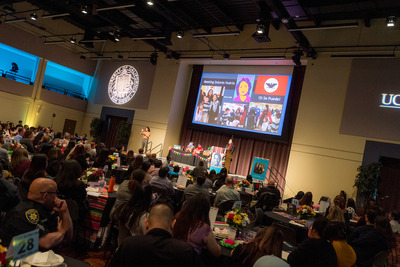
While inspiring millions through his own activism, Chávez himself drew inspiration from prominent leaders such as Dr. Martin Luther King Jr. and Mahatma Gandhi. Who or what inspires you?
“The people that inspired me are my two high school teachers, whom I still tutor with in their classes. I wasn't the best student back then and I had bad grades. However, these teachers were the first to see my academic potential and really fought for me throughout my high school experience. I attribute a lot of my success to them. And they don’t just do this for me—they extend this support to countless other students, too. Seeing how much of an effect they've had on my life and on others made me realize how much difference a single person can make." - Jonathan Rodriguez
“Definitely my family—they are a huge part of the reason for why I am standing here today. My parents are from la Ciudad de México (Mexico City) and they moved to Tijuana to start their family, which is where I was raised until I was five years old. When I was young, I didn't really understand why we were moving to the United States to begin with. However, now, especially at almost 24 years old, hearing all that they went through to provide us with better opportunities, I admire them even more and look up to them immensely. They're my role models, they're my whole heart, and I can say the same for my sisters. I’m appreciative of them being there for me, truly listening to me, giving me advice and motivating me. - Marissa Islas
“What inspired me were the women in my own family, starting with my mom. She came here as a 16-year-old immigrant from Mexico and was passionate about pursuing an education, but didn't have the opportunity to because she had to work and build a life for herself. She sacrificed so much so that her children could have opportunities. Also, mujeres like Dolores Huerta who have been part of the movement have been really powerful to me. This is in addition to people in my community, mentors and femtors who I've had throughout my life.” - Haydee Cervantes Salazar
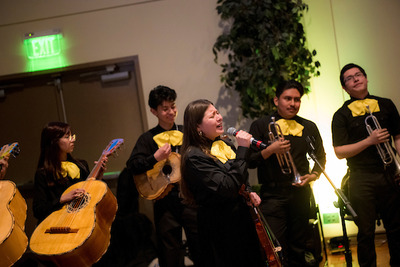
Chávez was a champion for diversity and equity, once saying, “We need to help students and parents cherish and preserve the ethnic and cultural diversity that nourishes and strengthens this community—and this nation.” Can you share something that you love about the culture and traditions of your own community?
“I really appreciate how important family is in the Latino culture. In our society, the family is highly valued and you're taught to always be there for our family members and to understand the importance of strong connections. I think it's a really amazing thing because having this social network really improves mental health, as well as overall physical health. Data shows how beneficial this strong social support system can be in mitigating health issues. So, this aspect of my culture is something I really cherish." - Jonathan Rodriguez
“I'm a proud Chicana. Especially being raised in Chula Vista, I'm so grateful for the strong sense of community that surrounds me, where Mexican and Chicano cultures are celebrated. I am grateful for living near places like Barrio Logan and Tijuana, where I can connect with beautiful people and celebrate the rich culture of our community. I love our art, music, food and people. The culture is so vibrant, creative and resilient. Above all, I cherish the emphasis on family and the support we show for each other, values that have been instilled in me since childhood.” - Marissa Islas
“Familial connection is really important in our community. I think it's especially crucial in today's society where things feel so fragmented and separated. We can look at others and see a familial connection, recognizing that they are just like anyone else and someone we could see in our own family. We all could benefit more when we work together and across community lines. When we look back to the United Farm Workers movement, we also see how many roots came from collaborating with Filipino workers. That history underscores the importance of connection and the ability to work across cultural divisions.” - Haydee Cervantes Salazar
Share This:
You May Also Like
Stay in the Know
Keep up with all the latest from UC San Diego. Subscribe to the newsletter today.
